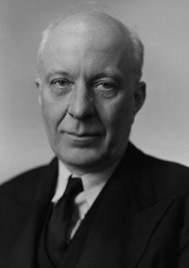| Profile | Major Works | Resources |
Hugh Dalton, 1887-1961.

British public finance economist and prominent Labour politician.
Educated at Eton and then King's College, Cambridge, where he studied economics under the young John Maynard Keynes. But Dalton found the appeal of socialism more entrancing and joined the Fabian Society at Cambridge in 1907. Coming into the orbit of the Webbs, Dalton went on to continue his studies as the then-Fabian citadel of the LSE in 1911-13. After serving in WWI on the Italian front, Dalton finished his doctorate at the LSE, and stayed on as lecturer. His main contributions were in public finance.
Dalton is perhaps most famous in economics for his 1920 article surveying various measurements of inequality. As his premise, Dalton embraced Pigou's 1912 utilitarian idea total welfare as the sum of individuals welfare, with the additional assumption that everyone had the same concave utility curve. On the basis of this, Dalton posited that a transfer of income or wealth from a rich man to a poor man that left the mean of a distribution unaffected (what is now known as a mean-preserving "Pigou-Dalton transfer") could be regarded as an unambiguous welfare improvement ("increase the sum of satisfaction"). Dalton called this the "principle of transfers". As a result, it might be possible to compare some income distributions with each other and judge them on welfare criterion. Specifically, it possible to determine that a particular distribution represents a greater "sum of satisfaction" than another distribution, if one can (by a series of equalizing Pigou-Dalton transfers) reach one from the other. Dalton compares various statistical measures of inequality which can capture this feature, proposing standard deviation and the Gini coefficient as perhaps the best (if still imperfect) measures.
Hugh Dalton emerged as a prominent figure in the Labour Party, serving as Labour MP since his first election to parliament in 1924, and in the party's national executive council by 1925. Dalton served briefly for a spell as a highly influential under-secretary of foreign affairs in Ramsay MacDonald's second Labour government (1929-31), but resigned when, in the depths of the Great Depression, MacDonald agreed to form a national coalition government with other parties.
The Labour Party suffered heavy losses in the 1931 election, and Dalton was among those who lost their parliamentary seats. Dalton was a leading figure in the reconstruction of the Labour Party, helping it recover its losses in the 1935 election. In 1936, Dalton finally resigned his academic posts in order to focus more fully on his new activity as chairman of the Labour Party in 1936. Dalton was the primary theorist behind the reorientation of the Labour Party at this time away from its gradualist approach, to a more ambitious nationalization program (Dalton was reportedly much impressed by the merits of Soviet planning after a trip to Soviet Russia). Dalton had pressed for the need for national planning and massive wealth redistribution to handle unemployment and growth in a series of tracts in the 1930s, and finally won over when Labour Party adopted a (limited) nationalization program as part of its party platform in 1937. He also pushed Labour away from its pacifist principles, urging it support confrontation with the Fascist regimes in Europe. This was also made part of the party platform in 1937.
During WWII, Hugh Dalton joined Winston Churchill's national unity government, serving as secretary of Economic Warfare from 1940 to 1942, with responsibility for managing the economic blockade of Nazi Germany, and then as President of the Board of Trade. After the Labour Party under Clement Attlee rocketed to victory in the 1945 elections, Hugh Dalton was made Chancellor of the Exchequer, and presided over the transition of Britain from a war economy to the post-war welfare state. Dalton was behind the Labour party's nationalization program, including the nationalization of the Bank of England, the establishment of the National Coal Board and the British Transportation Commission. But Britain's postwar economy was weak. After the sudden end of Lend-Lease, with Keynes's assistance, Labour secured a new American loan, but the money was quickly spent, and by mid-1947 Britain was in the throes of a foreign exchange crisis, for which Dalton was widely blamed. Dalton was forced to resign in November 1947, when he was found to have leaked budget details to a journalist. He remained in parliament until 1959, taking some minor cabinet posts in Labour governments along the way, but gradually lost much of his influence. He continued to be regarded as an elder party statesman, but the intellectual force had shifted to a younger generation under Gaitskell and Crossland. Dalton was raised to the peerage in 1960, and served briefly in the House of Lords until his death.
|
Major Works of High Dalton
|
|
HET
|
|
Resources on Hugh Dalton
|
All rights reserved, Gonçalo L. Fonseca
